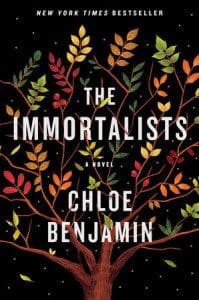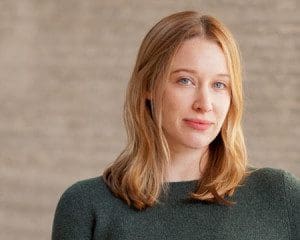I refuse, as a rule, to consult all fortunetellers, palm-readers, and tarot-card diviners. I won’t so much as glance at a horoscope; routinely, I forget what my own astrological sign might be. It’s not so much that I believe or disbelieve in what a fortuneteller might have to tell me, but that I distrust myself, not knowing how my future behavior might change in response to what any would-be oracle has to say.
Chloe Benjamin’s second, much-lauded novel, The Immortalists (352 pages; Putnam), follows four siblings who, as children, go to a fortuneteller to learn when they’ll die. Afterward, tensions between the future and the present, between predictions and reality, threaten to break this family apart. I talked via email to Benjamin (whose first novel, The Anatomy of Dreams, won the Edna Ferber Fiction Book Award) about her powerful, compelling new book, and about death, the present tense, and dance.
ZYZZYVA: I’m not at all alone in finding the central premise of The Immortalists—the possibility of finding out, and maybe even believing in, the date we’ll die—to be both terribly moving and terrifying. What brought you to this idea?
Chloe Benjamin: I know it sounds strange, but I have such a hard time answering this question! I think it’s because concepts, for me, always feel very subconscious—I don’t have a clear memory of the first time the idea hit me, but I do know that the basic kernel was always there: four siblings go to visit a fortuneteller, and then the book follows each of them over the course of their lives. I wish I had better origin stories. Stephen King has a great line that references the muses as “the boys in the basement”—this idea of people working away at some deeper level of a writer’s consciousness. Of course, as a feminist, I amend that to “the gals in the basement.”
Even if I can’t remember the precise spark, I do know that The Immortalists comes very much out of my own neuroses. I’ve always struggled with uncertainty and loss, which are intertwined, for me: the uncertainty of whether and when we will lose our loved ones, our happiness, our stability. And there’s no greater, or at least no more final, loss than death. It’s occurred to me that I would be able to slough off so much worry if I knew that I and those closest to me would live long lives. Of course, we can’t know that, but it got me thinking about what it would be like if we could know—with no guarantee that it would be good news. Is knowledge a blessing or a curse? A liberator or a hindrance? And to what extent are denial and ignorance actually positive forces in human life, in that they enable us to keep going?
Z: How about structure? When I started reading The Immortalists, I had the idea there would be a lot more switch-backing among the four siblings’ points of view. I really appreciated that instead you stayed with one sibling at a time. Can you talk about your thinking behind this structure?
CB: That structure was there for me from the beginning. And I always felt grateful for that because structure is hugely helpful to me psychologically. I knew that the book would be divided into roughly four parts after the prologue, so I knew about how many pages to give each sibling, and I had a form to help me craft the arc of each sibling as well as the arc of the book as a whole. I’m also drawn to books that are written in a close third and which give you the chance to see how different characters interpret the same event(s). But I appreciate, too, the emotional investment that comes from staying with one character over a long period of time. This structure felt like a way to have both.
Z: Could we discuss tenses? I think the present tense is, maybe, the hardest one to work with; here, it’s deployed so effectively. Was The Immortalists always in the present tense, or did it shift around? Did you find it at all difficult to use?
CB: Yes, we can discuss tense! I’m so glad you brought that up because no one else has, and I geek out on technical craft stuff. I remember playing around a bit with past and present when I was first working on the book, but it became clear pretty quickly that it needed to be in present. The novel has a lot of moving parts and it covers a lot of time, and it felt like present tense was the best way to also keep it fresh, raw and immediate. It also made it more clear for the reader when I was dipping into a flashback (since both present and past weren’t done in past tense, if that makes sense). There can be a claustrophobia to the present tense because you can’t see around it, but in the context of this book, especially the first two sections (Simon’s and Klara’s), it felt exhilarating because you’re moving through life alongside them in real time.
It was, though, a little bit hard to get used to in the beginning. I feel like we’re sort of trained to write in past tense. Do you think that’s true? Maybe it’s just that there are more books written in past than present (I suspect this is the case but have absolutely no evidence to back it up) so past feels like a standard. But the funny thing is that the novel I’m working on now is in past tense, and I keep catching myself using present. Certain long passages I wrote all in present tense before realizing it, and I now have to convert them to past. We often talk about the hangover feeling of having to leave the characters in a novel behind, but I think that can be true for the novel’s style of writing as well.
Z: I default to the past tense, for sure. Although, now that I think about it, there are present-tense instants in my novel, parts when the narrator feels compelled to address someone he’s missing. Speaking of immediacy, Simon’s dancing, oh my god. It’s so evocative and physical. Did you do a lot of research to inhabit his dancing?
CB: I’m so glad it felt that way to you. I’m a former dancer, so that was one of the few elements in the book that came out of my own life. I danced pre-professionally from the time I was twelve or thirteen until college; I thought I might audition for companies, but frankly, I wasn’t talented enough (and I loved writing too much). I always wanted to incorporate dance into a novel, but I didn’t expect to do it via male dancers. It was a lot of fun to work in the physical movements but also the jargon and the culture of a dance studio, which was part of my life for so many years.
 Z: I wonder if you’d mind talking about more about that dancing. It seems to me that dancers are so much more alive to their bodies than I, for instance, can ever be, as I sit at my desk for the nth hour today. Was it hard to leave this other life behind?
Z: I wonder if you’d mind talking about more about that dancing. It seems to me that dancers are so much more alive to their bodies than I, for instance, can ever be, as I sit at my desk for the nth hour today. Was it hard to leave this other life behind?
CB: It was, definitely. I went through a very painful mourning period in college after I left the dance school where I’d trained for almost ten years (which, er, spoiler alert, was the inspiration behind Simon’s school). It was a family there, a real community, and I had an intimacy with my dance friends that I didn’t have with anyone else. This sounds strange, but spending so much time around each other’s bodies—we changed together, went through injuries together, knew where the others held tension (for me, my neck!)—was a very profound experience for a teenage girl who was otherwise uncomfortable in her body. Of course, we also shared an immense emotional intimacy from all those hours spent together, more than I had with my school friends.
It’s interesting: looking at the above paragraph, I immediately jumped to the relational component of my time in ballet. But that really was what I loved most. Writing is so isolating, something you do (for the most part) alone, but dance felt more communal. You’re one of many bodies, and unless you’re the star (which I wasn’t), your goal is usually to become one with those other bodies, mimic the same movements, become closer to a shared ideal. That was also what made ballet difficult for me. I didn’t feel like an individual, and I didn’t feel an individualized sense of creative expression. Quite literally, in class, I never spoke. Maybe my longing for something more individualized is very American, almost embarrassingly so—but on the other hand, I do think that ballet’s emphasis on homogenous perfection can be unhealthy.
So that’s to say that I both miss it and am relieved to be free of it. The extent to which I miss it vacillates a lot and I often find myself longing not just for the community but for the physical movements that were so familiar to my body. But taking classes again would require going multiple times per week if I were to be in good enough shape to, well, avoid feeling frustrated every time I took class… not to mention getting back in a leotard! So I guess my relationship with dance is a little bit fraught: a ton of nostalgia and wistfulness, but also an awareness of how it asks for a potentially dangerous level of physical perfection.
Z: Something else I particularly appreciated about The Immortalists was the vital role played by characters’ jobs. I think there’s a real paucity, in fiction, of jobs, even though most living people spend a lot of time doing things that result in pay. Did you consciously set out to make the four siblings’ jobs so central to their stories, or did that just happen to transpire along the way?
CB: That’s such an interesting question. I hadn’t thought about the lack of work in fiction, but I think you’re right—maybe especially in literary fiction? I don’t think it was conscious; I just felt that each of their careers was essential to their identity, so exploring their careers would illuminate their inner lives, and perhaps vice versa. I’m also just fascinated by other people’s jobs. I think it’s something about being a fiction writer, spending so much time in my head and feeling so lucky that I can do this for a living, but also being aware of how absurd it is. Other people are performing surgery or teaching or doing the very hard working-class work that keeps our society together, and I’m making things up. I write less what I know than what I want to know, and I’m curious about people’s jobs, how they both loom so large in one’s life—taking up most of the time in a day, and therefore a lifetime—and are also, for many people, a totally separate identity than the one they adopt at home, or feel they are inside.
R. O. Kwon’s first novel, The Incendiaries, is forthcoming from Riverhead in July. She is a National Endowment for the Arts Literature Fellow, and her writing has appeared in The Guardian, Vice, Noon, Time, Electric Literature, Playboy, the San Francisco Chronicle, and elsewhere.

